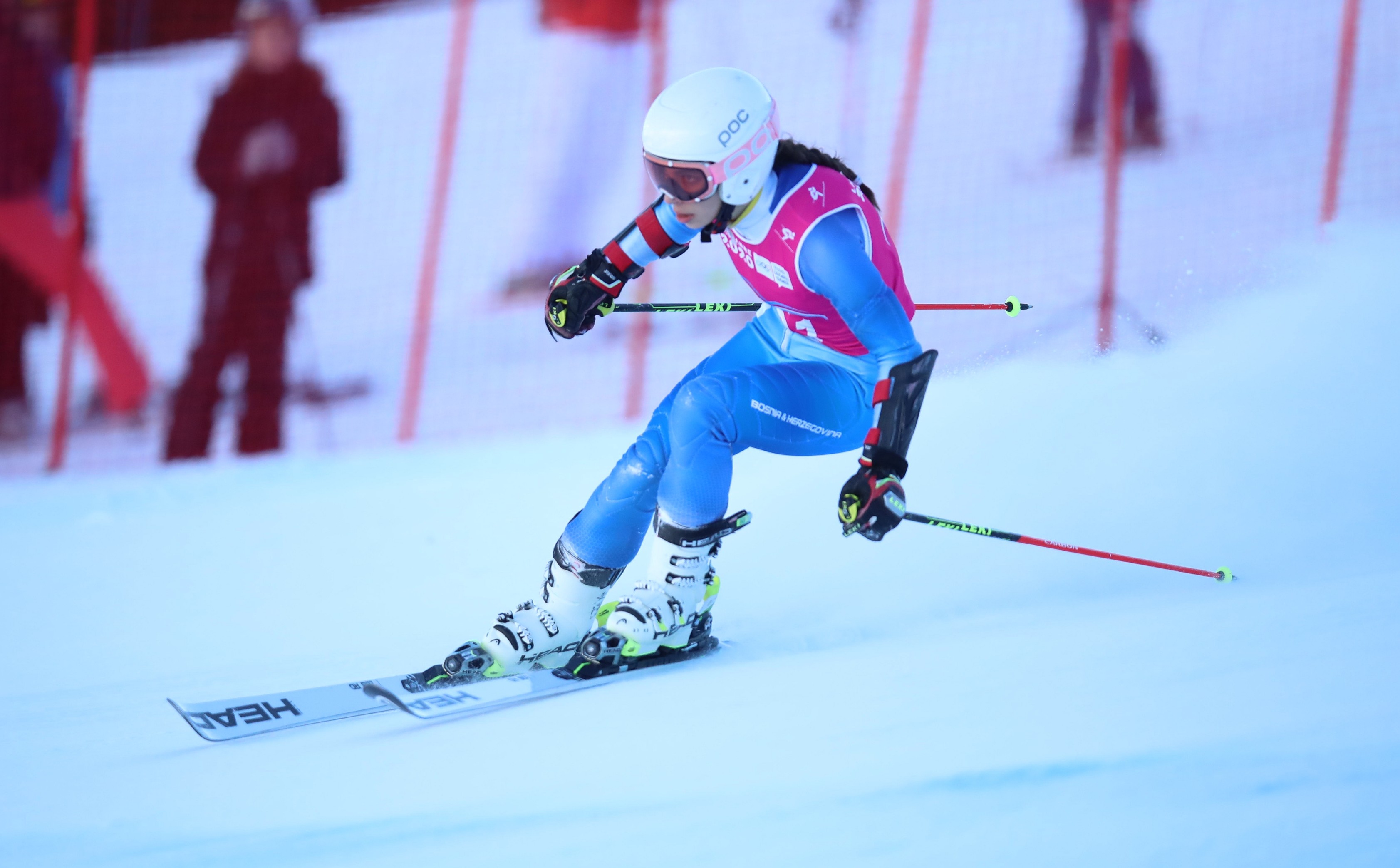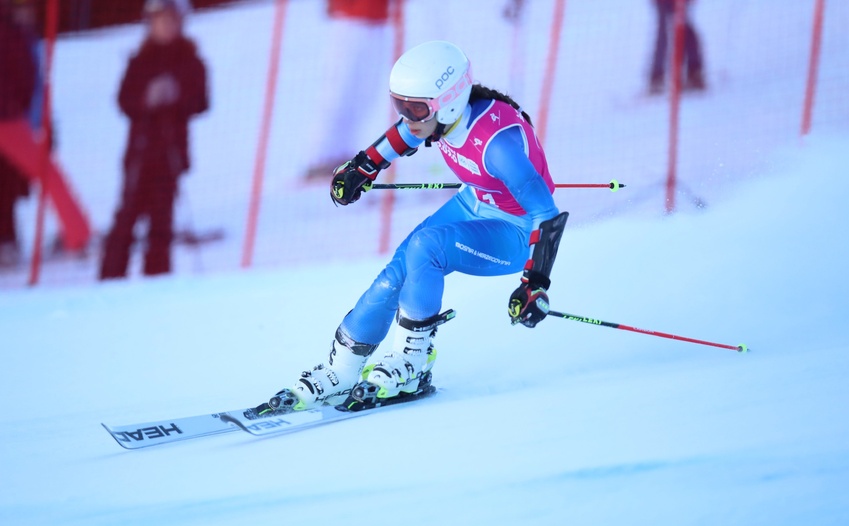Paving the Way for a Nation: Elvedina Muzaferija’s Journey in Alpine Skiing
Achieving groundbreaking milestones in alpine skiing is a proud feat, especially for a country with a limited presence in winter sports. But being a solo trailblazer can also be a heavy burden.
Elvedina Muzaferija, at just 25, understands this dynamic well. She has already made history for Bosnia and Herzegovina, a country not widely known for its winter sports achievements.
In 2020, she became the first female skier from Bosnia to score points in the World Cup. In 2023, she secured two top-10 finishes—another national first—including an impressive fourth place in the downhill at Crans-Montana.
Competing on your own isn’t easy.
“I really miss having a team,” she shared during the World Championships in Saalbach, Austria. “It would be great if there were three more Bosnian skiers here with me. But I’ve accepted that I’m forging a path for others—and right now, I’m doing pretty well.”
Elvedina is wholeheartedly embracing her role as a pioneer. In fact, she recently launched Skiing with Elvedina, an initiative focused on training young U14 and U16 athletes. “Helping younger skiers in Bosnia and being someone they can look up to makes me truly happy,” she said.
A Path from Visoko to the World Stage
Elvedina grew up in Visoko, just an hour from Sarajevo, and began skiing at age five alongside her older sister on Mount Bjelašnica—famous for hosting the men’s alpine events during the 1984 Winter Olympics. “Knowing legends once raced there made it even more exciting,” she recalled.
As she entered competitions, it became clear she lacked rivals in her own country. At 14, she moved to Croatia to advance her training. “I was winning every race in Bosnia and earning my country’s first medals at events like the Topolino and Pinocchio trophies, which are like mini world championships for kids.”
She stepped onto the international stage at the 2016 Winter Youth Olympics in Lillehammer, Norway. “Coming from Bosnia made qualifying easier, but it was such a valuable experience,” she said. She competed in four events, with a 16th-place finish in alpine combined as her best result.
Since then, she has competed in two Olympic Games.
Her debut was at PyeongChang 2018, where she proudly carried the Bosnian flag during the Opening Ceremony. “It was surreal. I just kept thinking, ‘Don’t drop the flag!’ the whole walk,” she laughed.
By Beijing 2022, her focus had sharpened. She competed solely in speed events and finished 25th in the Super-G, though two of her runs ended in DNFs. “I made some rookie mistakes, but it was all part of the learning curve. Now, I’m really looking forward to racing at my first Winter Olympics in Europe,” she said, with Milano Cortina 2026 less than a year away.
Overcoming the Odds
Despite her accomplishments, Elvedina faces significant challenges. “It’s tough coming from Bosnia,” she admitted. “You have to handle everything—from budgeting to organising—on your own. And skiing has become incredibly expensive.”
She often competes against athletes backed by national federations with abundant resources. “In a small country, there’s no system in place. No national team to train with. No daily push from teammates. You have to find your own way.”
Support from the IOC’s Olympic Solidarity Programme has helped ease the burden. She’s been a recipient of their scholarship since before the 2018 Games. “It’s a huge relief to know there’s something coming in monthly. I’m incredibly grateful,” she said.
She draws inspiration from other scholarship recipients like Zrinka Ljutić of Croatia and Albert Popov of Bulgaria, who have recently claimed World Cup victories. “They’ve proven you don’t need to come from a big country to succeed. That really motivates me.”
So far, no athlete from Bosnia and Herzegovina has won an Olympic medal—summer or winter—but Elvedina believes that can change. “I think I can go far. My ultimate dream is to bring home an Olympic medal.”
More Than an Athlete
Beyond skiing, Elvedina uses her voice to stand up for causes she cares about—particularly women's safety. A graduate in Sport and Physical Education from the University of Sarajevo, she has become a vocal advocate against domestic violence, an ongoing issue in Bosnia.
“We’ve had multiple cases involving young women—it’s heartbreaking,” she said. “I’ve been trying to raise awareness and show them they’re not alone. I’ve always believed in speaking up when something isn’t right.”
With the help of her team, she has leveraged her social media presence to highlight the issue. “If even one person feels empowered to speak up because of it, that’s a win for me.”
In 2024, she was invited to speak at UN Women’s 'Generation Equality' forum in Sarajevo, encouraging young girls not to give up on their place in society. “Girls belong, even if it doesn’t always feel that way—especially in underdeveloped countries,” she said.
Elvedina is also active in supporting children with special needs. “Athletes often have to be selfish, but off the slopes, I try to be someone who gives back,” she said. “As one of the most successful athletes in Bosnia, I want to use that platform to support victims, inspire change, and speak up where it matters.”
Achieving groundbreaking milestones in alpine skiing is a proud feat, especially for a country with a limited presence in winter sports. But being a solo trailblazer can also be a heavy burden.
Elvedina Muzaferija, at just 25, understands this dynamic well. She has already made history for Bosnia and Herzegovina, a country not widely known for its winter sports achievements.
In 2020, she became the first female skier from Bosnia to score points in the World Cup. In 2023, she secured two top-10 finishes—another national first—including an impressive fourth place in the downhill at Crans-Montana.
Competing on your own isn’t easy.
“I really miss having a team,” she shared during the World Championships in Saalbach, Austria. “It would be great if there were three more Bosnian skiers here with me. But I’ve accepted that I’m forging a path for others—and right now, I’m doing pretty well.”
Elvedina is wholeheartedly embracing her role as a pioneer. In fact, she recently launched Skiing with Elvedina, an initiative focused on training young U14 and U16 athletes. “Helping younger skiers in Bosnia and being someone they can look up to makes me truly happy,” she said.
A Path from Visoko to the World Stage
Elvedina grew up in Visoko, just an hour from Sarajevo, and began skiing at age five alongside her older sister on Mount Bjelašnica—famous for hosting the men’s alpine events during the 1984 Winter Olympics. “Knowing legends once raced there made it even more exciting,” she recalled.
As she entered competitions, it became clear she lacked rivals in her own country. At 14, she moved to Croatia to advance her training. “I was winning every race in Bosnia and earning my country’s first medals at events like the Topolino and Pinocchio trophies, which are like mini world championships for kids.”
She stepped onto the international stage at the 2016 Winter Youth Olympics in Lillehammer, Norway. “Coming from Bosnia made qualifying easier, but it was such a valuable experience,” she said. She competed in four events, with a 16th-place finish in alpine combined as her best result.
Since then, she has competed in two Olympic Games.
Her debut was at PyeongChang 2018, where she proudly carried the Bosnian flag during the Opening Ceremony. “It was surreal. I just kept thinking, ‘Don’t drop the flag!’ the whole walk,” she laughed.
By Beijing 2022, her focus had sharpened. She competed solely in speed events and finished 25th in the Super-G, though two of her runs ended in DNFs. “I made some rookie mistakes, but it was all part of the learning curve. Now, I’m really looking forward to racing at my first Winter Olympics in Europe,” she said, with Milano Cortina 2026 less than a year away.
Overcoming the Odds
Despite her accomplishments, Elvedina faces significant challenges. “It’s tough coming from Bosnia,” she admitted. “You have to handle everything—from budgeting to organising—on your own. And skiing has become incredibly expensive.”
She often competes against athletes backed by national federations with abundant resources. “In a small country, there’s no system in place. No national team to train with. No daily push from teammates. You have to find your own way.”
Support from the IOC’s Olympic Solidarity Programme has helped ease the burden. She’s been a recipient of their scholarship since before the 2018 Games. “It’s a huge relief to know there’s something coming in monthly. I’m incredibly grateful,” she said.
She draws inspiration from other scholarship recipients like Zrinka Ljutić of Croatia and Albert Popov of Bulgaria, who have recently claimed World Cup victories. “They’ve proven you don’t need to come from a big country to succeed. That really motivates me.”
So far, no athlete from Bosnia and Herzegovina has won an Olympic medal—summer or winter—but Elvedina believes that can change. “I think I can go far. My ultimate dream is to bring home an Olympic medal.”
More Than an Athlete
Beyond skiing, Elvedina uses her voice to stand up for causes she cares about—particularly women's safety. A graduate in Sport and Physical Education from the University of Sarajevo, she has become a vocal advocate against domestic violence, an ongoing issue in Bosnia.
“We’ve had multiple cases involving young women—it’s heartbreaking,” she said. “I’ve been trying to raise awareness and show them they’re not alone. I’ve always believed in speaking up when something isn’t right.”
With the help of her team, she has leveraged her social media presence to highlight the issue. “If even one person feels empowered to speak up because of it, that’s a win for me.”
In 2024, she was invited to speak at UN Women’s 'Generation Equality' forum in Sarajevo, encouraging young girls not to give up on their place in society. “Girls belong, even if it doesn’t always feel that way—especially in underdeveloped countries,” she said.
Elvedina is also active in supporting children with special needs. “Athletes often have to be selfish, but off the slopes, I try to be someone who gives back,” she said. “As one of the most successful athletes in Bosnia, I want to use that platform to support victims, inspire change, and speak up where it matters.”


 Elvedina Muzaferija: Bosnia’s Trailblazing Olympic Skier and Advocate
Elvedina Muzaferija: Bosnia’s Trailblazing Olympic Skier and Advocate





 Companies
Companies